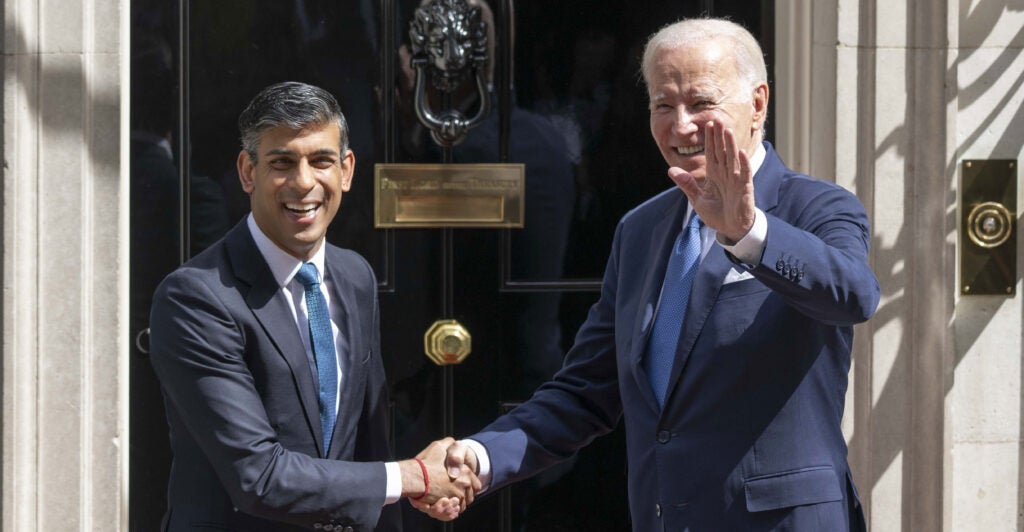LONDON—British Prime Minister Rishi Sunak, after first announcing a mandate requiring all fossil-fueled vehicles sold in the U.K. after 2030 to be electric, succumbed to pressure from the Conservative Party and within his own government and announced Wednesday a delay until 2035. His goal remains net zero by 2050.
Sunak’s goal continues to be based on his view that “climate change” is real and can be affected by what humans do. That remains debatable, but you wouldn’t know it from watching or reading British media, which, like U.S. media, regularly refuse to present arguments from scientists who disagree.
Asked about the effect of a government mandate for electric vehicles, one cabbie said he doesn’t like to turn on the air conditioner during summer for fear he will run out of electricity before his workday is done. Another told me he has a good deal at a parking lot that includes a charging station, which he uses for an overnight top-off. Few others have such an option. What about lengthy road trips or emergencies when the car battery is depleted?
Speed limits have been reduced to 20 mph in central London, which creates rush hour-type traffic jams at all hours of the day. Bike lanes and motor scooters further complicate traffic, as do traffic lights that turn red it seems after only two or three blocks. The same speed limit is being proposed for less-populated Wales. Supposedly reduced speed cuts pollution from gas-powered cars and limits accidents.
British public opinion is mostly opposed to the rapid transition from gas to electricity. A poll taken last May of readers of the Daily Express newspaper found a whopping 88% would not switch to an electric vehicle. More recently, that attitude seems to be changing, and why wouldn’t it, given the daily media drumbeat that the climate is getting worse and it’s the fault of humans.
According to the Society of Motor Manufacturers and Traders, “one in every 32 cars now comes with a plug, with 1.1 million electric cars now in use” on UK roads. While small compared with the total number of gas-powered vehicles on the road, the figure is up by more than 50% over the past year.
There are other problems, including paying China for the lithium needed for car batteries. Rep. Chris Smith, R-N.J., claims forced labor is being used to mine cobalt, exploiting children in impoverished Congo, the world’s largest producer of the mineral that is also needed for batteries. Should we be morally comfortable with this?
A London Times editorial gets it right: “Britain’s infrastructure is far from ready for this abrupt transition.” At least former Prime Minister Boris Johnson set 2035 as a transition goal.
Then there’s the cost. Among the cheapest prices I found in an online search was for a tiny two-door car costing nearly 36,000 pounds ($44,500). If you need a bigger car for a larger family, the price quickly escalates.
What happens when British and Americans—and who knows how many other nations—force their people to buy electric cars and world temperatures do not even modestly decline? Estimates of what it will cost are all over the place (like “end of the world” predictions coming from various sources who have been wrong with each of their forecasts). Bloomberg calculates lowering global temperatures will cost $200 trillion. Morgan Stanley says the cost will be $50 trillion.
This is all about politics, more government control of our lives, and the loss of individual freedom.
What happens when Britain and America have gone all-electric and the results are not as predicted? Who will take responsibility? Certainly not those now promoting this fiction. If you’re in government and pushing something that doesn’t pan out, you never have to admit error.
COPYRIGHT 2023 TRIBUNE CONTENT AGENCY LLC
The Daily Signal publishes a variety of perspectives. Nothing written here is to be construed as representing the views of The Heritage Foundation.
Have an opinion about this article? To sound off, please email letters@DailySignal.com and we’ll consider publishing your edited remarks in our regular “We Hear You” feature. Remember to include the URL or headline of the article plus your name and town and/or state.
